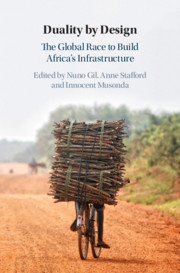16 results
Index
-
- Book:
- Duality by Design
- Published online:
- 14 November 2019
- Print publication:
- 28 November 2019, pp 415-424
-
- Chapter
- Export citation
12 - No One-Size-Fits-All Organisational Solution: Learning from Railway Developments in South Africa and Ethiopia
- from Part II - Exploiting Institutional Voids by Design
-
-
- Book:
- Duality by Design
- Published online:
- 14 November 2019
- Print publication:
- 28 November 2019, pp 353-377
-
- Chapter
- Export citation
Contents
-
- Book:
- Duality by Design
- Published online:
- 14 November 2019
- Print publication:
- 28 November 2019, pp vii-viii
-
- Chapter
- Export citation
Part I - Mitigating Institutional Voids by Design
-
- Book:
- Duality by Design
- Published online:
- 14 November 2019
- Print publication:
- 28 November 2019, pp 31-312
-
- Chapter
- Export citation
Appendix 2 - 6A.2 Determining the Cost of Centralized Generation
- from 6 - Centralized vs. Decentralized Generation in Zambia: Meeting Electricity Demand in the Context of Climate Change
-
- Book:
- Duality by Design
- Published online:
- 14 November 2019
- Print publication:
- 28 November 2019, pp 196-202
-
- Chapter
- Export citation
Figures
-
- Book:
- Duality by Design
- Published online:
- 14 November 2019
- Print publication:
- 28 November 2019, pp ix-x
-
- Chapter
- Export citation
1 - Duality by Design: The Global Race to Build Africa’s Infrastructure
-
-
- Book:
- Duality by Design
- Published online:
- 14 November 2019
- Print publication:
- 28 November 2019, pp 1-30
-
- Chapter
- Export citation
Acknowledgements
-
- Book:
- Duality by Design
- Published online:
- 14 November 2019
- Print publication:
- 28 November 2019, pp xvii-xviii
-
- Chapter
- Export citation
Part II - Exploiting Institutional Voids by Design
-
- Book:
- Duality by Design
- Published online:
- 14 November 2019
- Print publication:
- 28 November 2019, pp 313-410
-
- Chapter
- Export citation
Contributors
-
- Book:
- Duality by Design
- Published online:
- 14 November 2019
- Print publication:
- 28 November 2019, pp xiii-xiv
-
- Chapter
- Export citation
Reviews
-
- Book:
- Duality by Design
- Published online:
- 14 November 2019
- Print publication:
- 28 November 2019, pp i-ii
-
- Chapter
- Export citation
Appendix 1 - 6A.1 Existing and Planned Generation
- from 6 - Centralized vs. Decentralized Generation in Zambia: Meeting Electricity Demand in the Context of Climate Change
-
- Book:
- Duality by Design
- Published online:
- 14 November 2019
- Print publication:
- 28 November 2019, pp 195-195
-
- Chapter
- Export citation
Tables
-
- Book:
- Duality by Design
- Published online:
- 14 November 2019
- Print publication:
- 28 November 2019, pp xi-xii
-
- Chapter
- Export citation
Foreword
-
- Book:
- Duality by Design
- Published online:
- 14 November 2019
- Print publication:
- 28 November 2019, pp xv-xvi
-
- Chapter
- Export citation
Copyright page
-
- Book:
- Duality by Design
- Published online:
- 14 November 2019
- Print publication:
- 28 November 2019, pp vi-vi
-
- Chapter
- Export citation

Duality by Design
- The Global Race to Build Africa's Infrastructure
-
- Published online:
- 14 November 2019
- Print publication:
- 28 November 2019



